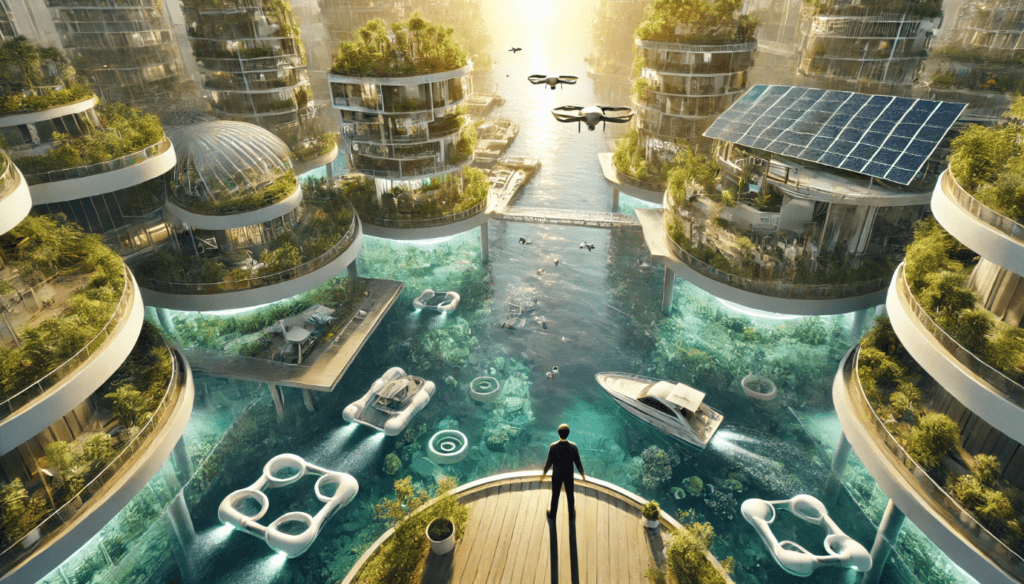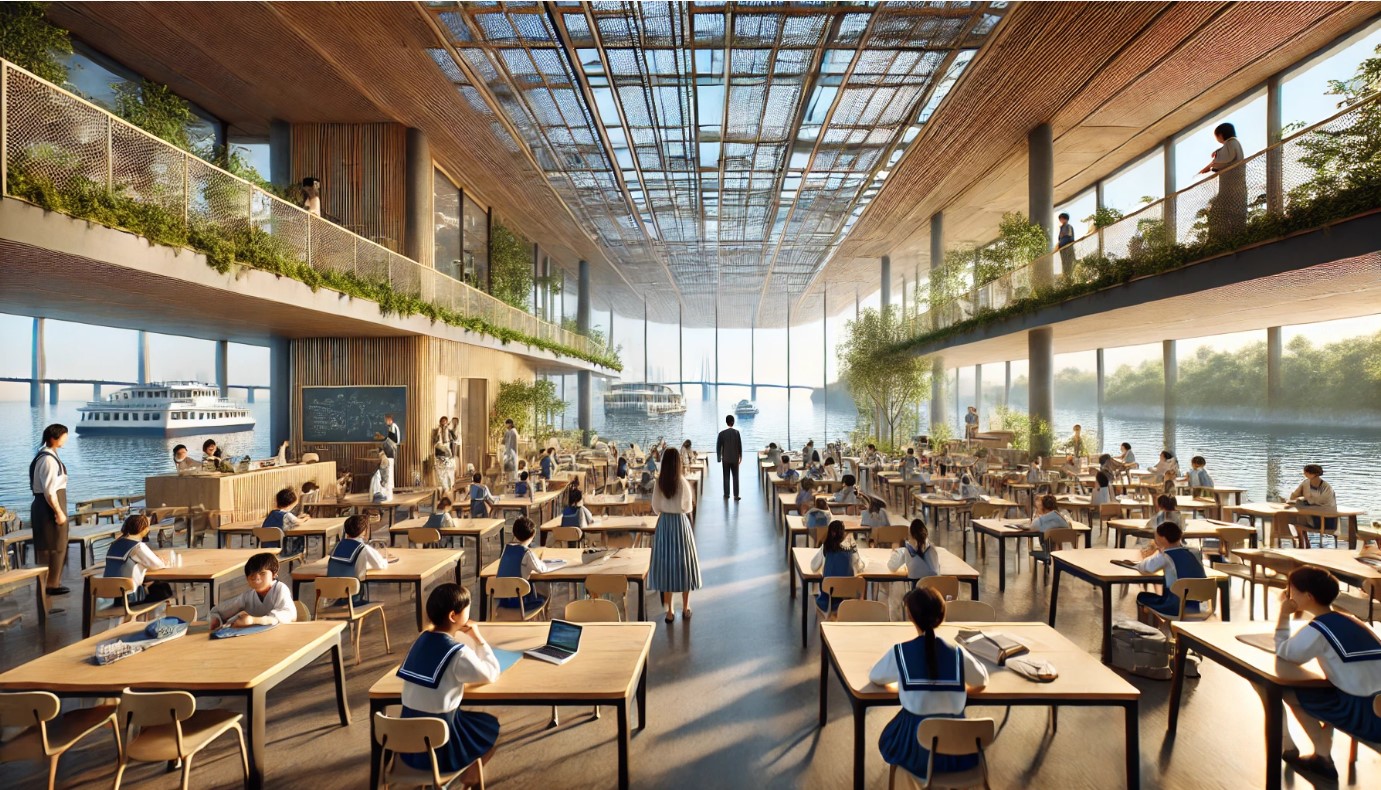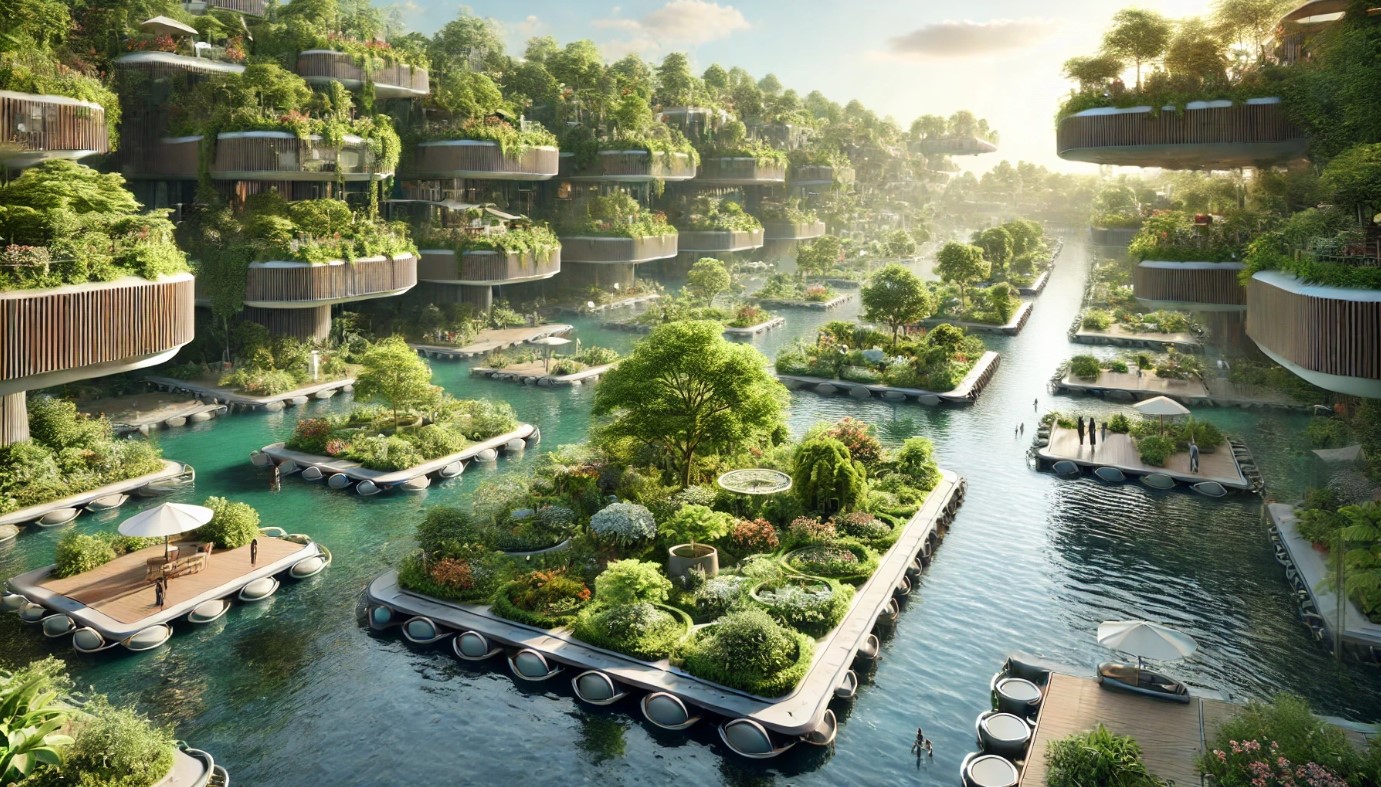As we continue to explore and develop sustainable living solutions for water-based communities, one concept at the forefront of this movement is the integration of artificial intelligence (AI). AI is no longer a technology reserved for science fiction; it is an integral tool that will shape how we live, design, and thrive on the water. Whether through managing infrastructure, predicting environmental challenges, or enhancing the day-to-day lives of residents, AI will revolutionize oceanic living.
In this article, I will examine how AI’s influence will create a seamless synergy between humans and the marine environment, unlocking a future where floating cities are not just a solution to land shortages but an intelligent, self-sustaining ecosystem.
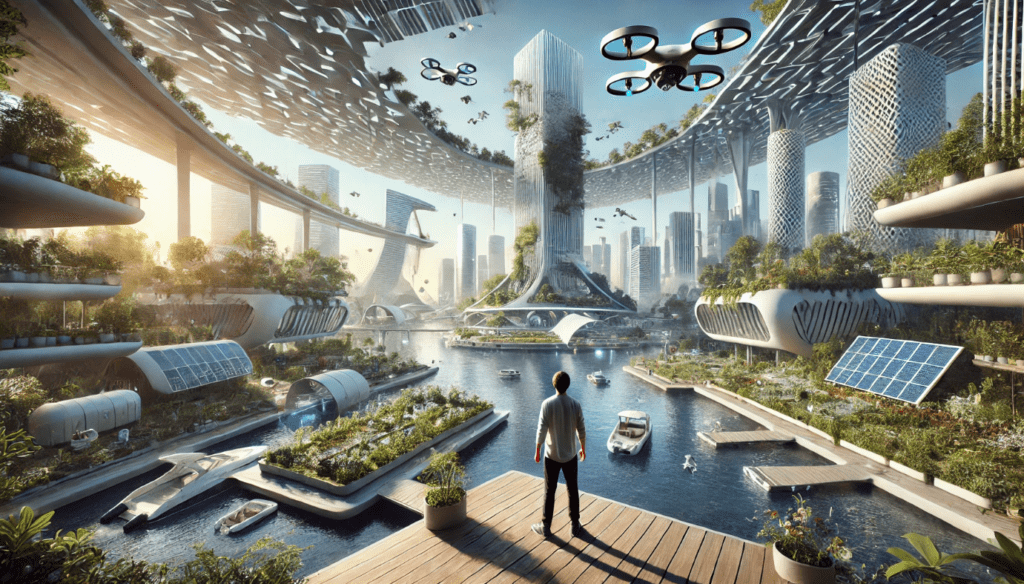
AI-Driven Infrastructure will be Efficient, Resilient, and Adaptable
Floating cities require more than structural integrity—they demand dynamic adaptability in response to the ever-changing oceanic environment. AI will be a central force in ensuring that these aquatic habitats can efficiently manage their energy, water, and waste systems, while also predicting and mitigating environmental risks such as extreme weather or rising sea levels.
Imagine a floating city where AI-driven systems monitor tidal flows and water quality in real-time, adjusting structural anchors and drainage systems to ensure stability. Smart grids, powered by AI, will predict energy consumption patterns, balancing renewable sources such as solar, wind, and tidal energy. By learning the patterns of each city, AI can intelligently distribute power where it’s most needed, ensuring a constant supply for residents without overburdening the ecosystem.
As our technology advances, we may even see AI-controlled drones and robots maintaining the infrastructure of these cities, performing inspections, cleaning marine debris, and conducting underwater repairs without the need for human intervention. AI’s potential to autonomously manage these processes will ensure that oceanic living is not only sustainable but also self-sufficient.
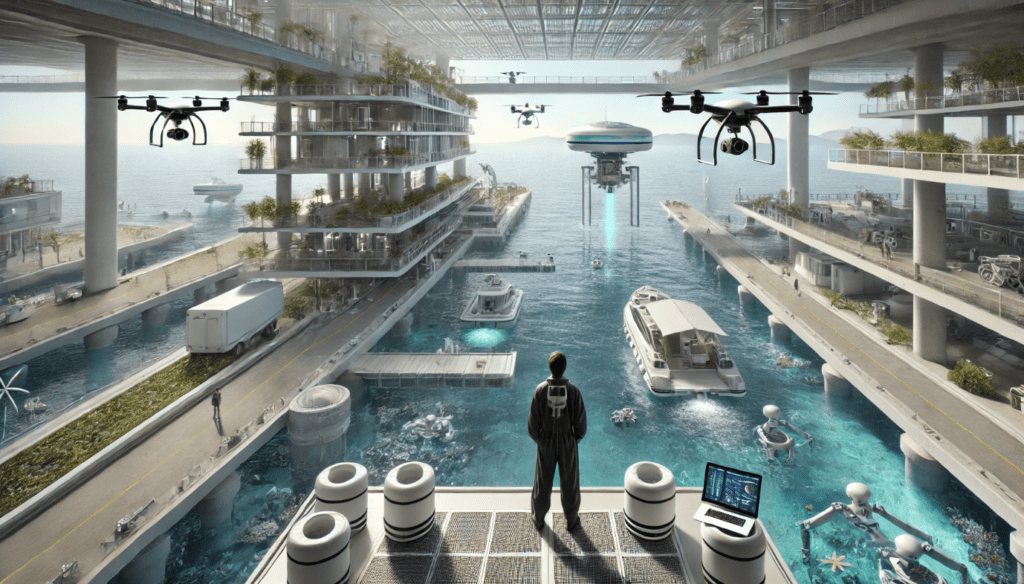
Smart Cities on the Water will Enhancing the Resident Experience
One of the most exciting prospects of AI is its ability to tailor the environment to the needs of individual residents. Living in a floating city will mean being immersed in a smart environment, where homes, streets, and public spaces adapt to human preferences and behavior.
AI will optimize everyday tasks, such as adjusting temperature and lighting based on the time of day or occupancy. Inhabitants could benefit from predictive healthcare, with AI monitoring vitals and recommending lifestyle adjustments to improve wellness. Smart homes will become an extension of the resident’s lifestyle, constantly learning and evolving to make life on the water as seamless as possible.
Public spaces will also be revolutionized. AI will help manage floating farms, gardens, and green spaces, balancing the needs of agriculture and biodiversity. Residents will enjoy parks that water themselves and hydroponic farms that produce a constant supply of fresh food, all monitored and managed by AI systems that ensure resource efficiency.
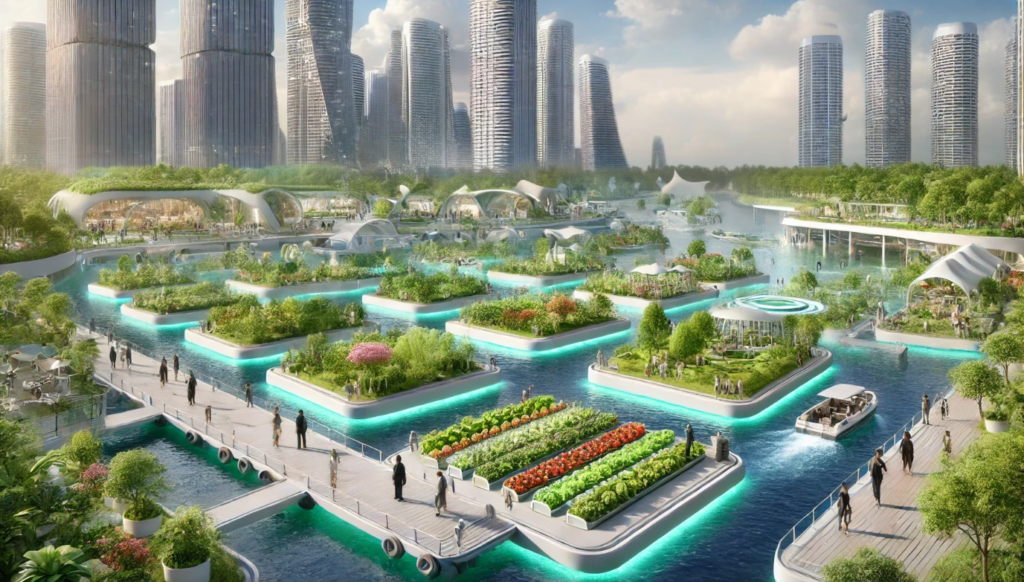
AI and Environmental Stewardship Protecting the Oceans We Inhabit
While floating cities present exciting opportunities for new modes of living, they also pose potential risks to the marine ecosystems that surround them. The responsibility of ensuring that these cities exist in harmony with the ocean falls largely on AI technologies.
AI will monitor and control waste management systems, ensuring that pollution is minimized. Drones equipped with AI could monitor the surrounding waters for signs of pollution, while underwater sensors track the health of nearby coral reefs and marine life. Any signs of imbalance or environmental stress could trigger automated interventions, from recalibrating waste processing to planting artificial reefs that encourage biodiversity.
One of the most important roles AI will play is in the collection and analysis of massive amounts of data about the ocean itself. From understanding marine life migration patterns to tracking climate change’s impact on ocean currents, AI will allow floating cities to become active participants in ocean conservation, rather than contributors to its degradation.
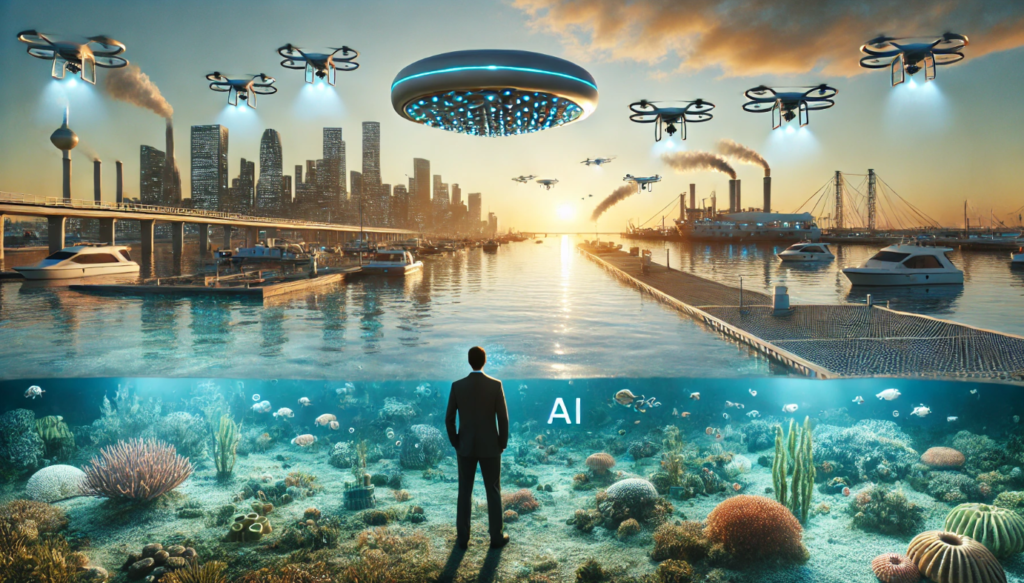
The Future is Now
The future of oceanic living is not some distant dream; it is unfolding now. As floating cities become more than just an architectural ambition, the role of AI in creating efficient, resilient, and sustainable oceanic habitats will be critical. AI offers a future where these water-based communities not only provide new ways of living but do so in harmony with the environment.
By integrating AI into every aspect of these cities, from infrastructure management to resident well-being and environmental stewardship, we are moving closer to a future where humans and oceans co-exist in a delicate but sustainable balance. With each technological breakthrough, we are transforming how we think about living—not on land but with the sea.
As I reflect on the potential AI brings to oceanic living, it is clear that technology will not only enable us to survive but to thrive in our water-based habitats, forging a path for humanity’s next frontier. The sea is no longer an obstacle to overcome; it is a platform for innovation, powered by the intelligent systems of tomorrow.
